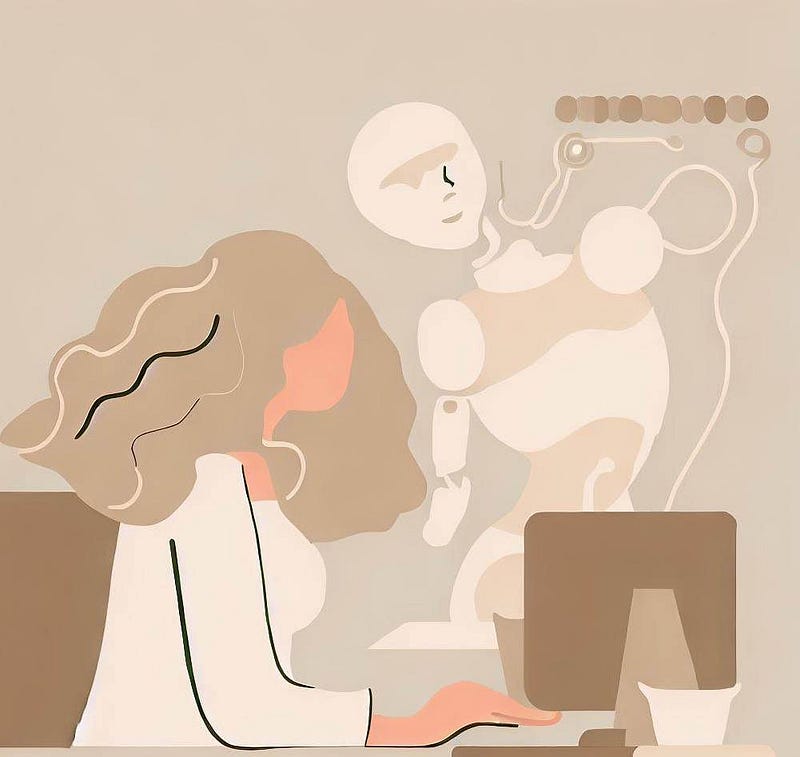The Evolution of Work: AI and Automation's Impact on Industries
Written on
The Transformation of Work in the Age of AI
The swift progress of AI and automation technologies is altering industries at an unprecedented rate. From the manufacturing floor to healthcare facilities, and from the finance sector to transportation networks, these revolutionary forces are redefining the future of employment. This article delves into the significant effects of AI and automation across various fields, emphasizing the opportunities and challenges they present, while also discussing how both individuals and organizations can adapt to thrive within this changing environment.
The Surge of AI and Automation
Innovations in AI and automation—encompassing machine learning, robotics, and natural language processing—have reached remarkable heights. They are transforming industries by augmenting human abilities, optimizing processes, and fostering new avenues for innovation.
Transforming Industries
Manufacturing and Logistics:
AI-driven automation has drastically changed the manufacturing landscape. Robots now execute repetitive tasks with precision and efficiency. For instance, companies like Universal Robots and Fanuc offer collaborative robots (cobots) that work alongside human employees on assembly lines, boosting productivity and minimizing errors. In logistics, AI solutions like Blue Yonder enhance delivery truck routes, cutting fuel usage and accelerating delivery times.
Healthcare and Life Sciences:
In the healthcare sector, AI is instrumental in diagnosing illnesses, interpreting medical imagery, and tailoring treatment plans. IBM Watson Health utilizes AI to analyze health data, aiding physicians in making accurate diagnoses. The integration of AI with genomics and precision medicine presents immense opportunities for improving patient care. Companies like PathAI are at the forefront, employing AI to scrutinize pathology slides and assist pathologists in identifying cancer and other conditions.
Finance and Banking:
AI algorithms are transforming the financial services industry by automating tasks such as fraud detection, credit assessments, and algorithmic trading. For example, Feedzai provides AI-based fraud detection systems capable of analyzing vast amounts of data to uncover suspicious activities. Additionally, AI-powered virtual assistants and chatbots, like those from Kasisto and Amelia, are revolutionizing customer service by offering personalized financial advice and helping clients manage their finances effectively.
Transportation and Autonomous Vehicles:
The advent of AI-powered autonomous vehicles is poised to revolutionize transportation. Companies such as Waymo, Tesla, and Uber ATG are developing self-driving vehicles that promise to enhance safety, alleviate traffic congestion, and streamline logistics. These vehicles utilize AI technologies, including computer vision and deep learning, to assess their environment, make real-time decisions, and navigate routes efficiently.
Opportunities and Challenges Ahead
Job Creation and Skill Enhancement:
Although AI and automation may displace certain jobs, they also pave the way for new roles and opportunities. The workforce of the future will need to focus on reskilling and upskilling to meet evolving job market demands, particularly in areas requiring creativity, critical thinking, and emotional intelligence. Skills in AI programming, data analysis, and collaboration with machines will be in high demand. Online platforms like Udacity and Coursera offer courses designed to help individuals acquire these essential skills.
Ethical Considerations:
As AI becomes more ubiquitous, ethical concerns take center stage. Matters such as data privacy, algorithmic bias, and accountability must be addressed to ensure the responsible deployment of AI technologies. Organizations need to prioritize the security and privacy of user data handled by AI systems. Companies like OpenAI are actively engaged in formulating ethical guidelines for AI use and promoting transparency in AI algorithms.
Workforce Flexibility:
Both organizations and individuals must cultivate a mindset of lifelong learning and adaptability. The ability to learn continuously, remain agile, and collaborate with intelligent machines will be critical for staying competitive in the future workforce. Programs that promote upskilling, mentoring, and a culture of innovation are vital. Platforms like LinkedIn Learning and edX provide valuable online courses and certifications to aid individuals in adapting to the shifting job landscape.
Collaboration Between Humans and Machines:
The future of work hinges on the collaboration between humans and machines rather than a rivalry. AI and automation technologies have the potential to enhance human capabilities, allowing individuals to focus on tasks that necessitate creativity, empathy, and complex problem-solving. While AI can efficiently process vast datasets, humans contribute unique insights, intuition, and contextual understanding to decision-making. Companies like Cognizant and UiPath develop AI-powered tools that amplify human productivity and collaboration.
The future of work is being reshaped by extraordinary advancements in AI and automation. Industries are undergoing transformative shifts that present both opportunities and challenges. To adapt effectively, a proactive approach is essential, emphasizing continuous learning and fostering partnerships between humans and machines. By embracing this mindset, individuals and organizations can thrive in a future where AI and automation not only enhance our lives but also drive innovation to unprecedented heights.
This article merely scratches the surface of the extensive implications of AI and automation on the future of work. As these technologies continue to evolve, it is crucial to remain curious, open-minded, and adaptable to navigate the exciting yet complex journey that lies ahead.

Chapter 2: Videos on the Future of Work
This video discusses the potential implications of excessive automation and AI on the future of work, exploring how these technologies might shape job markets and employment trends.
In this video, the focus is on the autonomous workforce and how AI is set to transform jobs permanently, highlighting both the challenges and opportunities that lie ahead.